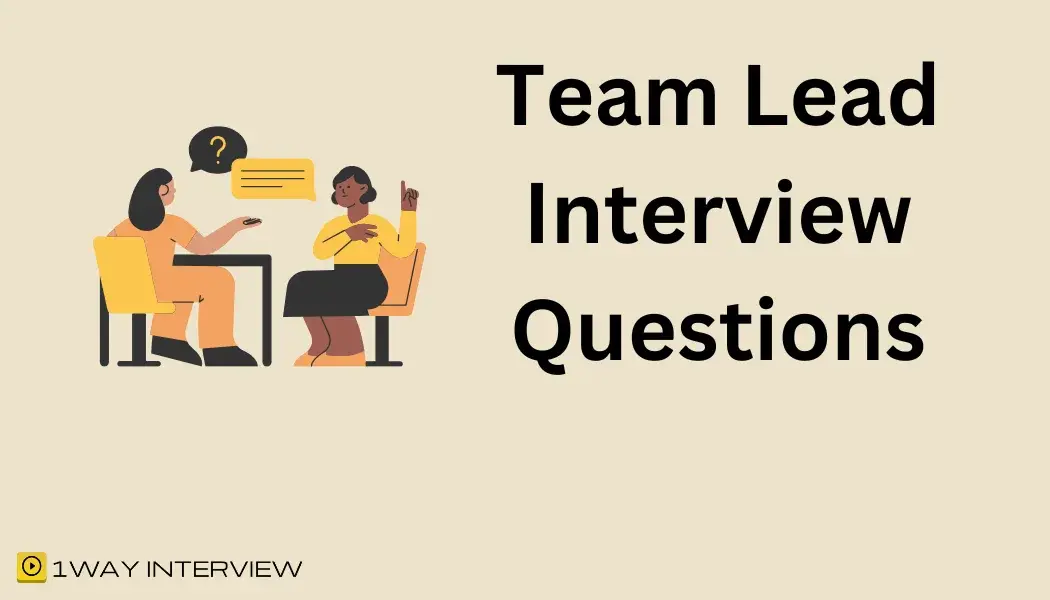Recruiting an ideal team lead is important for multiple directions, as this person will have a direct impact on organizational structure and performance. A team lead creates a link between the management and the employees and has to steer the team members towards their performance objectives and goals for team members to work cohesively. This position needs fluency in oral and written communication, leadership, and good organizational ability. Given this, employers should use the following tips while asking questions during the interview to find the ideal candidate for the position.

Key Qualities of Team Lead Employers Look For
A team lead should exhibit the following key qualities:
- Leadership Skills: Leadership qualities that will motivate the team to achieve set objectives.
- Problem-Solving Abilities: The best practice of anticipating and addressing the problems that may crop up in a team.
- Strong Communication: Clearness in both transferring directions and encouraging free feedback.
- Conflict Resolution Skills: Effective conflict-solving skills to deal with team conflicts and maintain harmony.
- Decision-Making Abilities: Performance confidence while making decisions under complicated conditions and stressful environments.
- Time Management: Expertise in time management; good skill in prioritizing tasks and managing deadlines effectively.
Best Practices for Interviewing Team Lead
While interviewing candidates for a new team with the position labeled as ‘team lead’, one should concentrate on the leadership and communication aspects.
- Focus on Behavioral Questions: Analyze how they perceive things and what they have learned from previous engagements.
- Evaluate Interpersonal Skills: Make sure they can deal with different people and create harmony among them.
- Scenario-Based Questions: Provide them with hypothetical scenarios to test them on how well they are at solving problems and handling conflicts.
- Assess Adaptability: Conduct an evaluation of their leadership skills with regard to the management of dynamic and complex environments.
- Cultural Alignment: Make sure the leadership style that they adopt does not contradict the organizational culture and norms.
Interview Questions for Team Lead
| Question | Criteria for Correct Answer | Criteria for Acceptable Answer |
|---|---|---|
| Could you give an example of how you can encourage a team to meet a difficult target? | Provides a real example with clear strategies (goal setting, incentives, motivation techniques). Demonstrates leadership impact with quantifiable success (e.g., exceeded target by X%). | Mentions motivation strategies but lacks a specific example or measurable outcome. |
| How do you respond to conflicts within a team? | Describes structured conflict resolution methods (active listening, mediation, clear communication). Provides an example of resolving a past conflict effectively. | Acknowledges conflict resolution but lacks structured methods or a real-world example. |
| Give an example of a situation where you were faced with pressure on your team in terms of deadlines. How did you solve the problem? | Shares a concrete example with a structured response (resource allocation, prioritization, risk management). Shows successful resolution of deadline pressure. | Provides a general response but lacks a structured approach or clear example of resolution. |
| Which parts of your work do you focus on first and how do you assign duties to yourself or your subordinates? | Mentions prioritization strategies (urgent vs. important, delegation, workload balance). Uses structured tools (Kanban, Trello, Asana). | Acknowledges prioritization but lacks a structured method or examples of effective task assignment. |
| How do you ensure that feedback is constructive whenever you are correcting a member of your team? | Uses structured feedback methods (SBI model, sandwich method). Balances positive and corrective feedback with clear action steps. | Mentions giving feedback but lacks structure or detailed approach. |
| In what way does your team quantify its achievement and value? | Mentions clear KPIs, performance metrics, OKRs, or business impact (e.g., productivity increase, cost savings). | Acknowledges tracking success but lacks concrete metrics or structured measurement. |
| Did you face a situation when you had to implement changes inside your team? How did you manage this task? Was it difficult for you? Was it stressful for your team? | Provides an example of change management (clear communication, gradual implementation, team buy-in). Shows leadership in reducing stress. | Acknowledges managing change but lacks structured methods or a clear success story. |
| What measures do you take to facilitate open communication among your team? | Mentions regular check-ins, transparency, feedback loops, and open-door policies. Uses tools (Slack, meetings, 1:1s). | Recognizes the importance of communication but lacks structured methods or practical tools. |
| Which factor would you attribute to the key role of a successful team leader? | Highlights essential leadership qualities (trust, accountability, adaptability, motivation). Provides an example of how these impact team success. | Mentions leadership qualities but lacks specific examples or detailed impact. |
| How do you cope with the need to meet organizational goals and objectives on the one hand and the social needs of your team on the other hand? | Balances business objectives with team well-being (clear goal alignment, workload management, motivation strategies). Provides a real-world example. | Acknowledges balance but lacks structured strategies or clear past experiences. |
Choosing the right candidate for the team lead role is an investment in the overall enthusiasm of your company, effective team performance, and peaceful organizational culture. Employers can get good talents who can do the job well and at the same time support the companies’ objectives and values. Make your performance and talent assessment easier with our interviewing tool, an offering that has been specifically developed to support employers in conducting interviews and hiring appropriate candidates effectively.